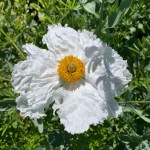This week’s botanical feature is the large white crinkled blossom of the California Tree Poppy (Romneya coulteri), also called the Matilija Poppy (referring to a canyon in Ventura County, where it is abundant). It was once a contender for state flower, but the California Poppy was given that title. The California Tree Poppy grows six feet tall, and once established will spread to eight feet or more. We cut this plant to the ground in the early spring, and it is now back to its full size and flower.

While we are social distancing, gardening keeps our emotions positive, and our viruses negative. Thinking about these objectives, we continue our exploration of accessible and productive gardening activities.
1. Care for Your Garden
Right now, late May, the “Chelsea Chop” is a useful gardening practice. This technique gets its name from Royal Horticultural Society’s Chelsea Flower Show, held around this time of the year. This exemplifies very British gardening, but it also works quite well for us colonists.
The Chelsea Chop helps control the size, shape and flowering time of certain summer-flowering plants. It applies to herbaceous perennial plants that flower in the early summer and particularly those that tend to flop.
The Chelsea Chop involves pruning back all the stems on a clump, which delays all the flowers by four-to-six weeks, or just half of the stems, which extends the plant’s flowering period further into the summer. Full pruning could be accomplished by shearing the perennial clump, while selectively pruning the clump could be done best with garden clippers.
This method encourages the production of a greater profusion of flowers. After “chopping,” fertilize the plants and provide a thorough watering.
Here are some of the herbaceous perennials that benefit from this treatment: Achillea; Asters; Campanulas; Echinacea; Heleniums; Helianthus; Nepeta; Penstemons; Phlox; Rudbeckias; Salvias (herbaceous species) and Sedums. Your garden could include some of these or other plants that would respond well to being “chopped” in late May.
This technique does not apply to woody perennials, which require different treatment. Roses, for example, should be deadheaded regularly at this time of the year to promote blooms.
2. Advance Your Gardening Knowledge
Assign yourself to a study one of your favorite plant genera and search the Internet for information to study.
Online sources are quick, easy and free. Wikipedia, for example, has detailed articles about roses and many other garden plants. To get started, browse to Wikipedia.com and search for “List of garden plants.” It’s impressive.
You could also get a book from the public library, a local bookstore, or an online shopping service, e.g., Amazon, depending on what is available in your community.
Depending on your level of interest, you could extend the study of your favorite plant genus by learning about other plants in the same botanical family. The Abelia, for example, is a member of the Honeysuckle family (Caprifoliaceae), which includes forty-two genera. Learning about your favorite plant’s relatives will broaden your understanding of its cultivation.
3. Enrich Your Gardening Days
Gardening can be an ideal pursuit while social distancing, but it is also a highly social activity, as evidenced by the hundreds of societies that gather like-minded gardeners to share ideas, experiences, and plants. These societies are now in hiatus, but in most cases their websites are running, and freely available for interested gardeners.
To locate a society for plants of your interest, search for your selected plant genus and “plant society.” For example, search for “rose plant society.” Other approaches start with the state, e.g., “California plant society,” or a plant category, e.g., “indoor plant society.”
A brief search could lead you to information from others who share your gardening interests. You don’t have to join a society to scan their online information. If the first search doesn’t yield helpful results, try a different search.
Enjoy your garden.
